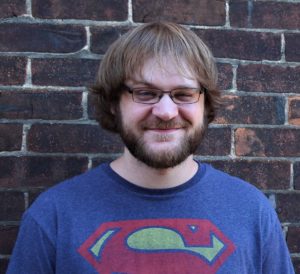Elegy with an Unraveling Cassette
1.
Maybe it’s the years, maybe the damage; maybe it’s the sagging brick
of every house I’ve ever lived in, or how a wound enclosed
inside the body, sometimes, isn’t possible to stitch; maybe it’s the body
broken down into the parts that make it, further even than to knuckle
or to bone, so far its elements become absurd, to simple matter,
but when the water recedes—the basement reduced to bare cement—
and my son’s breathing steadies him to sleep against my chest,
I find, again, a hole punched in whatever lets my death ignore me,
a moment that unveils itself in ambush, like smoke at first will seep,
then burst, from a troubled engine, no afterlife to tuck myself away to.
Outside, the bodies are accounted for: one pinned by a fallen branch
before the overpass at Nine Mile, one dragged beneath the belly
of a hydroplaning Dodge while wading toward the median at dusk,
and while the sirens quiet along the avenue, the myth I’ve labeled history
is limping on to empty out its pockets on my nightstand once again,
even as most of it escapes my notice. When a branch of wiry blood
extends undetected across the eye’s white space after weeping—
the universe’s smallest solar flare—we go on seeing, somehow,
and as I lay my boy into his crib, what awareness I briefly wear collapses
back into the cloud of instances I am: myself again, only a little less.
2.
The way gifts of memory appear, belatedly, in vacant rooms and lots
can render logic useless. A stranger’s kiss might remove me to the lips
of a lover I haven’t seen or spoken to a year or more, my hands loosed
on the cresting of some forgotten want, just as a plastic bag
ensconced between a vine’s wild fingers on a neighbor’s fence or
an I love you shouted from the window of a passing car can root me
to a strip of earth, as though I’d sprouted from the sidewalk like grass
reaching through its cracks. The past is always badly seen at best,
dispersing into dark, a shadow of the thing I search for,
until I’m called back by glance, or habit, or a lull in conversation
to the silhouette of one I loved, the houses bobbing along beside us
before they turned to empty plots, the whole street—the pavement
of our child’s first steps—obscured from the freeway by a billboard
plugging the finale of a long-cancelled sitcom. When touring the ruin fails,
again, to yield acontext to how my mouth becomes a draft dodger
and the nights hang, unraveling into darkness like shoddy cassettes, I reel
toward the street, and cast myself from hand to hand along a parade
of those who see some use for me, imagining that our fleeting gestures,
desperate in their tenderness, are jumps and strides up some staircase
ascending out of loss. A deluge of images can seemingly disperse
a single image—bad news diluted by a rash of news—but patience
and a spate of sleepless evenings are all it takes to parse things
and when someone else’s lonely partner texts me risqué lyrics after
drinks at 2 AM, I take two Tylenol and lie back down beside the crib.
3.
Because in spring, some mornings, the light inside of buildings seems
extra artificial, somehow, resigned to wrestle with the spillage
of the rising sun to stay lit; because a stranger shouts and guns
his pickup through our parking lot too early, the pavement relieved
of its debris; because at dawn, the smoke that drifts into my kitchen
every morning from beneath the sink, like clockwork, doesn’t come—
a signal that the sky’s cleared, and our neighbor’s ventured outside
for the day’s first cigarette—when my son wakes, he corrals me
toward the door, and we step out like a held breath, scouring the grass
for last fall’s forgotten leaves, yet to decompose, to cup them
with the shovel of his plastic excavator into piles. Because my memory’s
a kind of current—a neuron’s signal through synapse, a discourse—
and I want to think I can divert its access into something more convenient
than a habit or a trigger, and encase my son’s voice when he tells me Daddy sit,
mid-scoop, for deliberate recall, I watch him closely, to impress his features
to the black holes suspended in my irises—as if one day I might not
recognize him, as if I could forget his earnest invitation to bear witness
to the shifting of the earth, to the texture of loose soil between our fingers,
and how he’s glad of me, his taller and sometimes slow-to-understand
companion—to preserve it all before, one day, the snow will set in
like static at the end of a videotape, before the day there isn’t any snow
at all, no tape, and all that’s left of me is a movement in the curtains, or
a breath on the window in the shape of an old scar, a presence
like a scent clinging to a vase after the flowers and stale water are removed.
Because he points toward the jungle gym and counts two pupas—people—
racing up the stairway to the slide, and pauses to remember something
I will never know, I reach into the still-soft earth and plant a leaf
into the well we’ve dug, and wait for something, everything, to grow.
biography

ANDREW COLLARD lives in Kalamazoo, MI, where he attends grad school and teaches. His poems can be found in Ploughshares, Crab Orchard Review, and Crazyhorse, among other journals.